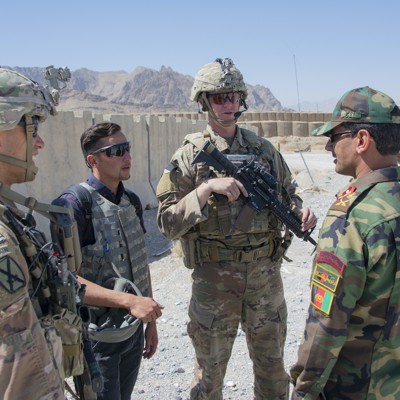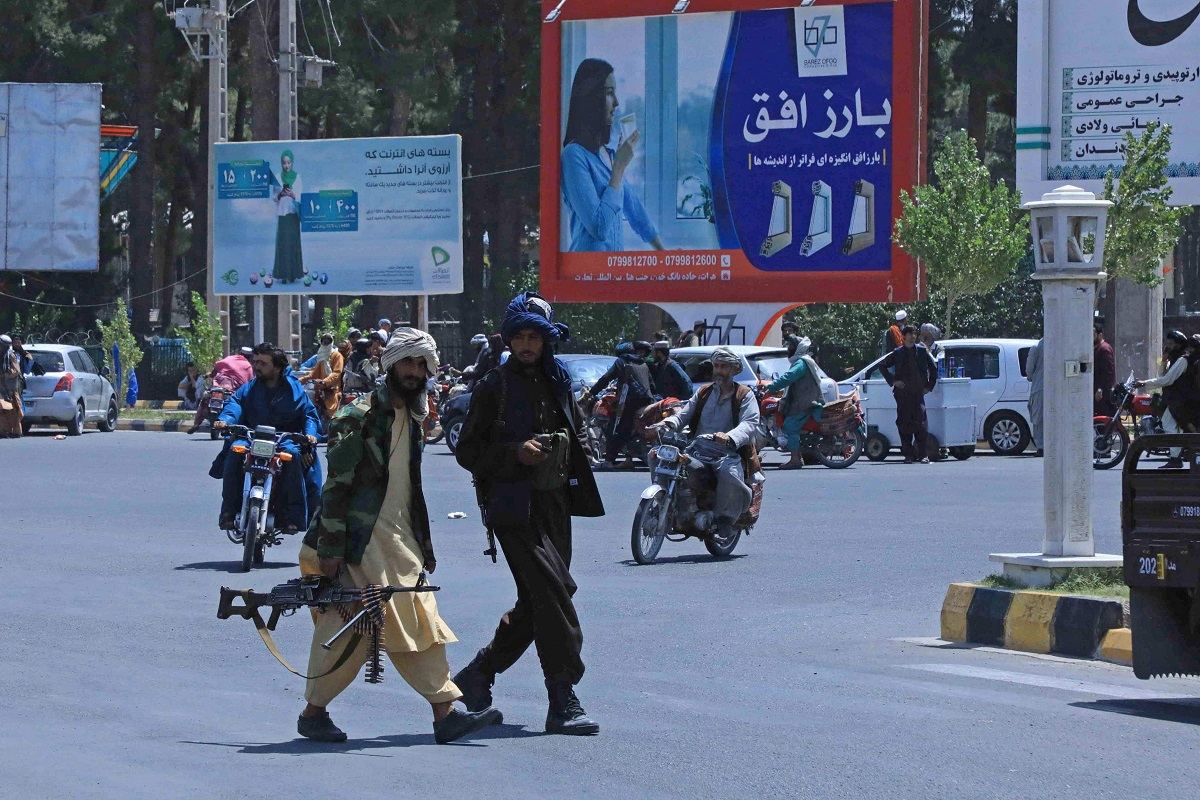Sellaistakin mielipidettä näkyy, että Afganistanin kansa näin haluaa osoittaa itsenäisyyttään, ulkovaltoja vastaan, ja taliperslävet ovat muka kansan tahtoma hallitusmuoto. Afganistanissa ei ole mitään yhtenäistä kansaa, kuten vaikkapa meillä Suomessa, vaan maa on jakaantunut enemmän tai vähemmän sukurutsaisten heimojen hallintoalueiksi. Niitä ei yhdistä mikään muu kuin halu hyötyä unikkopelloista, niin omista kuin naapureidenkin, ja niistäpä sitten soditaan. Rahat tulevat eri maanosien mafioista, varsinkin Etelä-Amerikan suunnalta, mutta myös Kiina ja Eurooppa ovat mukana.
Install the app
How to install the app on iOS
Follow along with the video below to see how to install our site as a web app on your home screen.
Note: This feature may not be available in some browsers.
You are using an out of date browser. It may not display this or other websites correctly.
You should upgrade or use an alternative browser.
You should upgrade or use an alternative browser.
Afganistan
- Viestiketjun aloittaja Teräsmies
- Aloitus PVM
-
- Tagit
- afganistan
Jotta saisitte lisää hepuleita. Osa ANA ilmavoimista on vaihtanut puolta ja siellä lentelee nyt talebaneja täynnä olevat helikopterit. Seuraavaksi kun saisivat pommikoneet käsiinsä niin se olisi siinä. Btw 22/34 provinssikaupunkeista talitinttien hallussa ja 50km enää Kabuliin. Tuskin tulevat Kabuliin menemään ennenkun USA saa evakuonnit valmiiksi.
Coffee Man
Respected Leader
Lisäksi tuo demokratian vienti on osoittautunut tuonne lähi-idän suuntaan epäonnistuneeksi tuotteeksi muutaman muunkin sotilasoperaation muodossa, joten oli aika naiivia olettaa senkään ottavan tuulta alleen sen suuremmin noissa olosuhteissa.
Demokratian vieminen ihan mihin tahansa suuntaan on aina ja poikkeuksetta virhe. Ja se on virhe jonka USA on toistanut lukemattomia kertoja milloin missäkin.
Ei mihinkään maahan voi viedä demokratiaa niin että vieraat voimat kävelevät maahan rynkyt kädessä ja toteavat että nyt tulee demokratia tai kuolema. Eikä sekään kyllä asiaa muuksi muuta että yleensä yhteistyökumppaneiksi valikoituu jo ihan käytännön syistä kaikenlaiset roistot jotka ottavat apua vastaan tasan niin paljon ja niin kauan kun joku idiootti sitä niille työntää.
Afganistaniin tunkeutuminen syystä tai toisesta on suunnilleen typerintä mitä tässä maailmassa voi tehdä.
Afganistan on saanut lempinimekseen Imperiumien Hautausmaa sillä useat eri suurvallat ovat hyökänneet Afganistaniin tässä kuitenkaan onnistumatta. Tämä johtuu lähinnä maan vuoristoisesta maastosta ja heimoyhteiskunnasta, minkä vuoksi vaikka suurvallat voivatkin melko helpolla miehittää maan, sen hallussapito on osoittautunut lähes mahdottomaksi. Suurvaltojen invaasiot seuraavatkin kaikki lähes samaa kaavaa: suurvallan invaasio menee aluksi hyvin ja merkittävät asutuskeskukset saadaan miehityksen alle mutta paikalliset käyvät sissisotaa vuorilta käsin ja lopulta suurvalta vetäytyy maasta.
Heimoyhteiskunta joka on muuta maailmaa muutaman vuosituhannen jäljessä ja jonka suurin vientituote on oopiumi eri muotoihin jalostettuna...sinnehän sitä kannattaa lähteä demokratiaa viemään


Tuo kaveri raportoi hienosti mitä siellä tapahtuu ja helikopterit näkyvät myös hänen twiiteissään.
Pommikoneet? Ei liene montaa, ja nuo helikopteritkin näyttivät ikivanhoilta rysslandin vehkeiltä. Onkohan lentotaitoista ja motivoitunutta henkilöstöäkään ihan helpolla saatavissa.Jotta saisitte lisää hepuleita. Osa ANA ilmavoimista on vaihtanut puolta ja siellä lentelee nyt talebaneja täynnä olevat helikopterit. Seuraavaksi kun saisivat pommikoneet käsiinsä niin se olisi siinä. Btw 22/34 provinssikaupunkeista talitinttien hallussa ja 50km enää Kabuliin. Tuskin tulevat Kabuliin menemään ennenkun USA saa evakuonnit valm
Anteeksi väärä sanavalintani AN-29 taitaa afgaaneilla olla. Ja kyllä siellä lentotaitoista porukkaa on ovathan itse amerikkalaiset niitä kouluttaneet 20-vuotta ja sitä ennen venäläiset jne. Talitinteillä ei motivaatiosta ole puutetta usko pois.Pommikoneet? Ei liene montaa, ja nuo helikopteritkin näyttivät ikivanhoilta rysslandin vehkeiltä. Onkohan lentotaitoista ja motivoitunutta henkilöstöäkään ihan helpolla saatavissa.
Erityisen hyödyllistä saatu kokemus on, jos Suomen vuoriston lukutaidottoman, mutta lukumäärältään suuren väestön aseellinen vastarinta pitää kukistaa. Voimme katsoa vierestä (tai mieluummin turvaetäisyydeltä), kun maailman parhaalla aseistuksella varustettu joku muu laittaa kevyellä aseistuksella varustetut ryysyläisjoukot kuriin.Afganistanin kokemuksista on hyötyä jos joudumme tulevaisuudessa kurittamaan Kainuun Separatisti-rintamaa (KSR) Suomi-Venäjä maaotteluun tuskin saatiin suurempia oppeja. USA:n strategisissa laskelmissa Suomen osallistuminen Afgojen operaatioon ei paina tuhnun vertaa, apua saadaan jos se on jenkkien geopoliittinen edun mukaista vaikka olisi sodittu Talebanin puolella.
Olisihan Afganistanissa kai ollut myös taistelutehtäviä tarjolla Suomelle mikäli poliittista tahtoa olisi löytynyt. Onneksi ei löytynyt niin ei tullut tappioita kuin 2 henkilöä kuolleina.
Motivaatiota varmaan piisaa, mutta tuskin lentotaidon opettelemiseen. Se on ins allah!Anteeksi väärä sanavalintani AN-29 taitaa afgaaneilla olla. Ja kyllä siellä lentotaitoista porukkaa on ovathan itse amerikkalaiset niitä kouluttaneet 20-vuotta ja sitä ennen venäläiset jne. Talitinteillä ei motivaatiosta ole puutetta usko pois.
Olympiakasarmi
Kenraali
Talibanit ovat ilmeisesti vallanneet Mazar-i-Sharifin. Vielä tänään oli ainakin yksi matkustajalento Mazarin ja Kabulin välillä.
Olympiakasarmi
Kenraali
Ainakin Mazarissa on käyty kovia taisteluja. Taliban on nyt Char Asyabissa 11 km etelään Kabulista.Taliban ei varsinaisesti ole valtaamassa mitään. Paikalliset militiat vain siirtyvät kuittaamaan palkkansa jenkkien sijaan taliksilta. Dollareina maksetaan kuten ennenkin.

Taliban capture key northern city, approach Afghan capital
The Taliban have captured a large, heavily defended city in northern Afghanistan in a major setback for the government.
Over these past 20 years, there have been many failings. We checked the box when it came to saying that we had trained our partners, spun a rosy narrative of progress, and perhaps prioritized the safety and well-being of our troops over the mission of buttressing partner capacity. (When our Afghan partners shot at us, killing our comrades in the now infamous “green on blue” incidents, we tightened up our security procedures but didn’t address the hard questions of why they were shooting at us in the first place.) We didn’t send the right people, prepare them well, or reward them afterward. We rotated strangers on tours of up to a year and expected them to build relationships, then replaced them. We were overly optimistic and largely made things up as we went along. We didn’t like oversight or tough questions from Washington, and no one really bothered to hold us accountable anyway. We had no capacity or experience with some of our tasks, and we stumbled.
Yet these failings—egregious as they were—make it easy to focus on the armed forces as a scapegoat. In fact, the military, our allies, and our Iraqi and Afghan partners were responding to a lack of coherent policy and strategy.
We invaded Afghanistan with righteous anger after 9/11, but then what? Why was the United States in Afghanistan for years afterward? What about our fraught relationship with Pakistan and its influence in Afghanistan? A coherent strategy to address these questions would have made my job easier on the ground. First and foremost, a clearly articulated end goal would have assured our Afghan partners and our allies from other nations (as well as our foes) of our determination. Instead of leaving the entire effort to the Department of Defense, a coordinated strategy with commensurate resources across government could have produced better results in multiple Afghan institutions. Further, 20 years ago, a commitment to law enforcement might have been very attractive to our allies, many of whom have their own national police force and a track record of success in performing such missions. Perhaps most crucial, a clear and forceful foreign policy regarding Pakistan, coupled with a commitment to supporting and employing a new Afghan army, would have provided much clarity and focus for our military.

How I Failed My Afghan Comrades
Military officers like me thought we were building a capable Afghan security force. What did we get wrong? Plenty.
We didn’t fight a 20-year war in Afghanistan; we fought 20 incoherent wars, one year at a time, without a sense of direction. The U.S. military can and should be blamed for the collapse of security forces in Afghanistan—I hold us responsible. The current collapse keeps me up at night. In the military, the main effort gets the best resources and the best talent available. For more than 20 years, no matter what was reported, what we read in the headlines, efforts to build and train large-scale conventional security forces in Afghanistan and Iraq have mostly been an aimless, ham-fisted acronym soup of trial and error that never became the true main effort, and we are to blame for that.
But we are not the only ones responsible. Someday we will ask young men and women to do this again—to fight a war overseas, to partner with local forces, to train them and build them up. Before we do, we owe it to those young people to ask the tough questions of how, and why, we all fail
Tiukkoja sanoja kouluttajalta ja
 sille että he ottavat vastuun tapahtuneesta. Hyvä kirjoitus.
sille että he ottavat vastuun tapahtuneesta. Hyvä kirjoitus.Kyllä ne siellä jo lentelee, että maansha allah vaan.Motivaatiota varmaan piisaa, mutta tuskin lentotaidon opettelemiseen. Se on ins allah!
NimenomaanKyllä ne siellä jo lentelee, että maansha allah vaan.
Ressuna
Kapteeni
Eiköhän Afganistanin armeijan sotilailla kuin lentäjilläkin paras motivaatio ole että kun vaihdat ajoissa puolta niin voit säilyttää henkesi. Ja käsittääkseni osa armeijan sotilaista oli ihan talibanin sinne käskemiä tiedustelumielessä.Kyllä ne siellä jo lentelee, että maansha allah vaan.
Olympiakasarmi
Kenraali
USA:n toimittamien koneiden huolto on ollut täysin ulkomaisten alihankkijoiden hoitamaa, ja nyt kun he ovat lähdössä maasta, koneiden huolto voi olla vaikeaa. Sen sijaan Mi-17 helikopterit saadaan varmaan toimimaan "naapuriavulla". Niitä kun on Iranilla, Pakistanilla, Turkmenistanilla ja Uzbekistanilla ja sieltä voi vaikka salakuljettaa varaosia.Eiköhän Afganistanin armeijan sotilailla kuin lentäjilläkin paras motivaatio ole että kun vaihdat ajoissa puolta niin voit säilyttää henkesi. Ja käsittääkseni osa armeijan sotilaista oli ihan talibanin sinne käskemiä tiedustelumielessä.
USA:n toimittamien koneiden huolto on ollut täysin ulkomaisten alihankkijoiden hoitamaa, ja nyt kun he ovat lähdössä maasta, koneiden huolto voi olla vaikeaa. Sen sijaan Mi-17 helikopterit saadaan varmaan toimimaan "naapuriavulla". Niitä kun on Iranilla, Pakistanilla, Turkmenistanilla ja Uzbekistanilla ja sieltä voi vaikka salakuljettaa varaosia.
Eiköhän ne USA koneetkin saada toimimaan jos ne haluaa. Iran on lennelly F-15 hävittäjiä jo 40-vuotta ilman amerikkalaisten apua ja Venezuela F-16 hävittäjiä. Noihin verrattuna helikopterit on lastenleikkiä.
Coffee Man
Respected Leader

Naiset lähtivät aamulla burka-ostoksille, kertoo lähde Kabulista – Taliban etenee tunti tunnilta kohti kaupunkia
Jo vallatuista kaupungeista raportoidaan, että tyttöjen pääsy kouluun on estetty ja virkamiehiä on teloitettu työpaikoilleen.
Jep, ovat lennelleet. Tositoimissa hiukan vähäisempiä saavutuksia.
Eiköhän ne USA koneetkin saada toimimaan jos ne haluaa. Iran on lennelly F-15 hävittäjiä jo 40-vuotta ilman amerikkalaisten apua ja Venezuela F-16 hävittäjiä. Noihin verrattuna helikopterit on lastenleikkiä.
